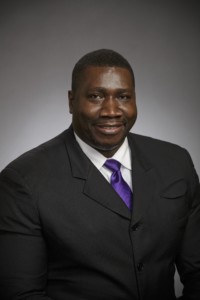PRAIRIE VIEW, Texas (September 29, 2021) – To students anywhere aspiring to attend dental or optometry school: Max Winshell Fontus, Ph.D., has walked the same road as you. He studied for, took, and eventually passed the standardized tests you face now, one of the daunting hurdles standing between many students and their chosen careers. But beginning in 2018, the assistant director of the Texas Undergraduate Medical Academy at Prairie View A&M University (PVAMU) went a step further. He became a test constructor who helps write and review questions for physics content on the Optometry Admission Test (OAT) and, within the past year, a test constructor for organic chemistry content on the Dental Admission Test (DAT). By adding this to his resume, Fontus is making it more likely that the best and most committed medical students can add the graduate school and program of their choice to their resumes.
“The Medical Academy is explicitly involved in helping our students get into dental schools, and we have a pretty good track record,” Fontus said about his initial decision to become involved with standardized test development, evaluation and improvement. “I thought, ‘What better way to continue guiding these students, and our PVAMU students in particular, who aspire to secure post-graduate degrees in the health professions than helping them get through the door?’ I jumped at the opportunity, and it was a win-win situation in my book.”
Test construction panels are staffed with volunteer subject matter experts “responsible for developing clear, accurate test questions in accordance with the specifications of examination programs,” according to the American Dental Association website. Subject matter experts write new questions and evaluate old ones, ensuring that test content is accurate, reliable, valid and fair. They can also be called upon to submit clinical images, draw visuospatial graphics and otherwise meet the targeted needs of the panel on which they sit.
Fontus, who has worked at PVAMU for 14 years, has a background in mathematics (as an undergrad at Pennsylvania State) and dynamical systems and theoretical physical chemistry as a graduate student (he completed his M.A. and Ph.D. at Indiana University).
“I was a good test taker, but we’re trying to eliminate all the things that made me a good test taker,” Fontus said with a laugh.
He said that the questions written and reviewed by his panels fall into three categories: those that have been used previously in exams and are part of the database (constructors review and advise whether to keep or discard them); pre-database questions that will require further review before they can be added to the database; and new questions that will need to be tested before they can be added to the pre-database pool. In the latter two categories, students taking the tests unwittingly serve as change agents, Fontus explained.
“A lot of the review involves understanding how test results reveal when a question isn’t achieving what it was written to achieve,” Fontus said. “If you have a question where the better students, those who score high on the exam as a whole, are not doing well, that’s usually an indication that the question is flawed. You want a question that is written so that it causes some separation between your better students and the rest, so your better students come through it and get into the school of their choice. Maybe we can re-pose the question in a different way.”
Fontus agreed that the test-constructing process considers many mitigating factors. For example, test takers have a limited amount of time to devote to reading and comprehension before they can answer a question correctly. Questions must be direct and simple in the sense of understanding what is being asked — they can’t be vague or cause confusion. “I don’t want students fighting about what I mean — they don’t have that kind of time,” Fontus said. “Good questions take aim at the heart of what we want them to know. A lot of it is removing extraneous factors that may add to the question’s degree of difficulty but don’t serve the purpose of a post-graduate entrance exam.” If students end up guessing, Fontus said, the stats on the completed tests will reveal it.
Applications for volunteers will reopen by the end of the year for the next cycle, and Fontus hopes that other professors will see getting involved in as positive a light as he does. “I would encourage any faculty member, especially those that are on tenure-track, to join these types of panels that will afford them professional development opportunities and a chance to expand their network and net worth,” he said.
By Andrew Cohen
-PVAMU-

